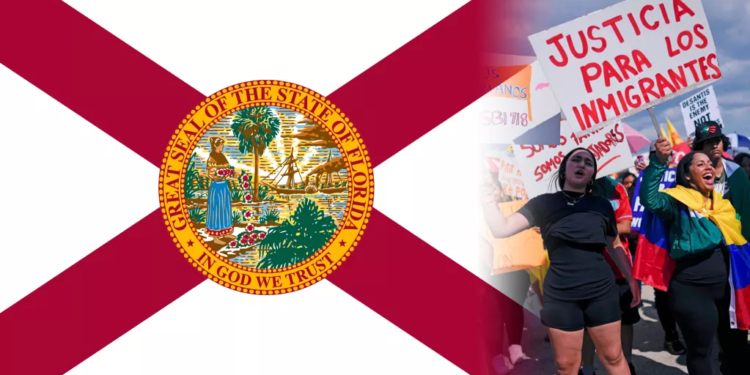Last month, FAIR issued a report detailing the Biden administration’s flagrant abuse of parole authority to allow illegal aliens to enter the country. Since President Biden took office, about 1.8 million otherwise inadmissible aliens have been paroled into the country, and during the first two quarters of FY 2023, parolees actually outnumber legal immigrants being admitted with green cards.
A sizeable chunk of the parolees arrive under a special parole program the administration has set up for Cubans, Haitians, Nicaraguans and Venezuelans (CHNV), allowing them to fly directly to destinations in the U.S. Between January 2023 and February 2024, more than 386,000 arrived in the U.S. under the CHNV program. Of those, 325,995 touched down at two Florida airports, according to data analysis by the Center for Immigration Studies (CIS). This is far too many for Gov. Ron DeSantis’ liking.
CHNV and other parolees who arrive at ports of entry are recorded as encounters with DHS’s Office of Field Operations (OFO) because they have no legal authority to enter the U.S. and thus are deemed “inadmissible”—or in other words illegal. In Fiscal Year 2022, the year prior to the establishment of CHNV, there were 35,349 such OFO encounters in Florida. In FY 2023, that number shot up to 236,691 – a 550 percent increase. Since Florida does not have any land ports of entry, the implementation of CHNV is the only logical explanation for the spike.
Not all of the parolees remain in Florida, but given the state’s already sizeable ex-pat communities of CHNV nationals, its booming economy and tropical climate, it is likely that a significant number remain in the Sunshine State. Although Florida has taken steps to discourage illegal aliens from settling in the state, most notably SB 1718, that effort is being undermined by the Biden administration’s parole abuse. A key component of that law is stiff penalties on employers who knowingly hire illegal aliens, a deterrent that is short-circuited by the Biden administration’s abuse of parole authority.
Twenty states, including Florida, filed a lawsuit when the CHNV program was announced in January 2023, aiming to shut it down. However, last month, Federal Judge Drew Tipton dismissed the lawsuit because, in his opinion, the states failed to demonstrate that they were being harmed by the Biden administration’s massive parole program and thus did not have legal standing to sue.
Gov. DeSantis and Florida Attorney General Ashley Moody are not giving up, however. Last week Attorney General Moody contended that “Biden’s egregious and unlawful immigration policies are disproportionately taxing the resources of certain states,” Florida being one of them. “As with Biden’s other unlawful policies, we will continue to fight the CHNV program in court,” she added.
It’s hard to prove the precise extent of the harm when the federal government – the target of the suit – refuses to disclose the whereabouts of the millions of parolees it has allowed into the country (if they even bother to keep track). Nevertheless, the circumstantial evidence is overwhelming. As one example, within the first few months of the CHNV program, Miami-Dade County Public Schools experienced an increase of 20,000 new immigrant students. The vast majority of them were recent arrivals from the four CHNV countries: Cuba, Haiti, Nicaragua and Venezuela.
At a base cost of $11,123 per student in the Miami-Dade system, that initial spike in enrollment after implementation of CHNV, represented an additional $222 million expense to the school district. On top of that, since many of the new arrivals do not have permanent homes, “They can now get free breakfast, free lunch. They can get transportation. They can get school supplies, uniforms, clothing, groceries,” one school official noted. These new costs come on top of the more than $8 billion a year Florida was already expending on illegal aliens and their dependents.
“We’ve been after [the Biden administration] on this parole for a long time, we’ve actually won in court, and it’s our hope we’re going to be able to get that shut down,” Gov. DeSantis declared last week. With new evidence that the administration has turned parole into a shadow immigration system that circumvents Congress’ plenary authority over immigration policy, and that a disproportional share of parolees are being funneled through his state, all evidence indicates DeSantis has a very strong case as he continues his fight.






























Discussion about this post